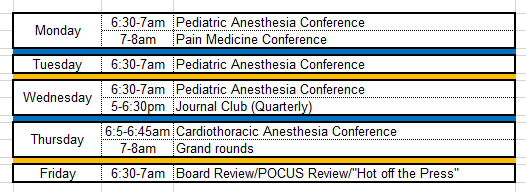Educational Activities
 Learning Opportunities
Learning Opportunities
Education Days

 Anesthesiology residents at University of Rochester receive training in multiple point of care ultrasound (POCUS) modalities relevant to the perioperative and emergency settings. Our POCUS director, Dr. Brandon Lebow, is a dedicated and passionate instructor. He is well known for his POCUS skills and has recently won the Ronald A. Gabel Excellence in Teaching Award for our department.
Anesthesiology residents at University of Rochester receive training in multiple point of care ultrasound (POCUS) modalities relevant to the perioperative and emergency settings. Our POCUS director, Dr. Brandon Lebow, is a dedicated and passionate instructor. He is well known for his POCUS skills and has recently won the Ronald A. Gabel Excellence in Teaching Award for our department.
The goal for this curriculum is to ensure that each resident will become a trained novice in POCUS through an introduction to US physics and mechanics, a curriculum with gradually increasing case complexity, and repetition of concepts and skills. The areas of POCUS that are taught include Lung Ultrasound, Gastric Ultrasound, Transthoracic Echocardiography (TTE), Airway Ultrasound, and the FAST exam. Resident will receive an introduction to reading Transesophageal Echocardiography (TEE).
The learning of POCUS involves the acquisition of a set of required competencies including the ability to recognize appropriate indications, obtain and optimize imaging, identify anatomy, interpret normal findings and pathology, and integrate findings into clinical practice. These competencies require a combination of cognitive knowledge, workflow understanding, as well as manual, spatial, and problem-solving skills to be practiced and reinforced longitudinally. This curriculum uses both standard and “flipped classroom” didactics, simulation, and hands-on learning during protected learning sessions to convey, practice, and reinforce the relevant knowledge and skills.
The curriculum includes:

-
A one week intensive bootcamp introducing the basic concepts of POCUS, which takes place in the afternoons during the first week of CBY anesthesia orientation.
-
Monthly small group education sessions to practice hands-on learning whose themes will rotate based upon the six core areas of POCUS.
-
Monthly Friday morning case conferences reiterating important POCUS concepts and relating them to clinical vignettes.
Sub-Specialty Didactic Series
In addition to full days dedicated to specific subspecialty topics, several of the subspecialty rotations have their own dedicated morning conferences series. Pediatric Anesthesia and Pain Medicine hold sessions earlier in the week, and Cardiothoracic Anesthesia's conference precedes Thursday morning's Grand Rounds series.
Friday morning didactic sessions have a rotating monthly schedule. One Friday each month is dedicated to an ABA written exam keyword review through questions. Another session uses case vignettes to highlight and review key concepts in the clinical application of Point of Care UltraSound (POCUS). A third Friday is called "Hot off the Press," and is a fast paced review of recent anesthesiology related publications and their implications in the everyday delivery of anesthesia.
Example of our weekly didactic schedule:

Board Prep
Preparation for the ABA written and applied board exams is woven throughout our educational activities. We incorporate multiple choice questions into our education day lectures as practice for the Basic and Advanced Science exams. ABA keywords are assigned daily and reviewed intra-operatively by residents with their attendings. Prior to the Basic and Advanced exams, we dedicate full education days to board review for the CA1s and CA3s, respectively. These cover the most common topics and the most commonly missed topics with both lectures and board style questions. The residents also have paid access to realistic Qbanks to review on their own throughout residency.
With regards to the applied exam, we have small group sessions built into education days to practice answering oral exam style questions. The senior residents also participate in two mock oral exams a year to assess progress with real ABA oral board examiners and stems similar to those used on the exam. We have two full education days annually for the senior residents that are dedicated to practicing for the Observed Structured Clinical Examinations (OSCE) exam with realistic simulations and scenarios.
Follow us on 

